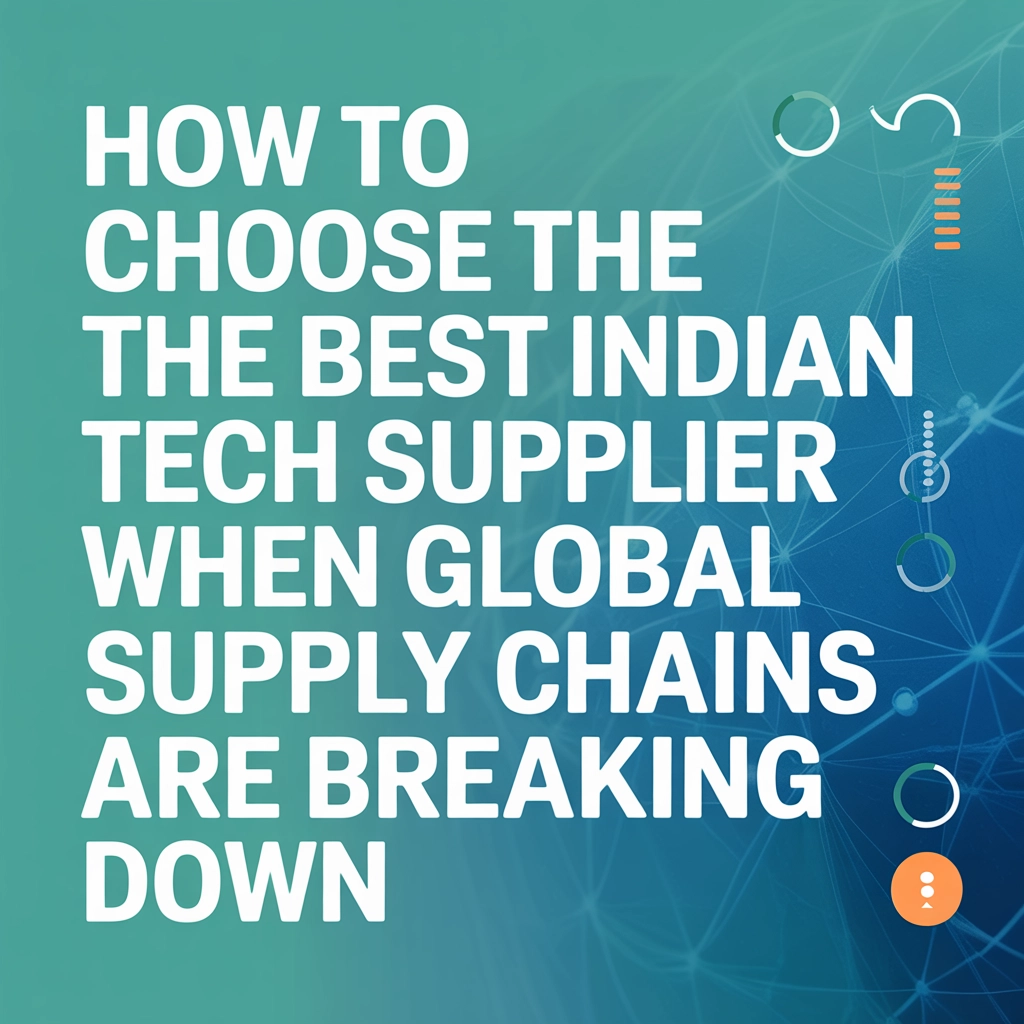Global supply chains are more fragile than ever. Between geopolitical tensions, shipping delays, and unexpected shutdowns, businesses are scrambling to find reliable alternatives. If you're an Israeli importer looking for tech suppliers, India might be your answer: but only if you know how to choose the right partners.
Here's the thing: India isn't just another cheap manufacturing hub anymore. It's become a tech powerhouse with 5.43 million IT professionals and world-class manufacturing capabilities. The key is knowing how to navigate this landscape when everything else is falling apart.
Why India Makes Sense Right Now
When supply chains break down, you need three things: reliability, flexibility, and quick adaptation. India delivers on all fronts.
First, geographic advantage. While other manufacturing regions deal with port closures or shipping bottlenecks, India's multiple shipping routes and robust infrastructure keep goods moving. Plus, the time zone works well for Israeli businesses: you can communicate during overlapping hours without the middle-of-the-night calls that come with East Asian suppliers.
Second, cost efficiency without compromising quality. Indian tech suppliers have mastered the art of delivering international standards at competitive prices. They're not the cheapest option anymore, but they offer the best value when you factor in quality and reliability.
Third, political stability. Unlike some regions facing ongoing tensions, India maintains stable relationships with most trading partners, reducing the risk of sudden export restrictions or diplomatic issues affecting your supply chain.

The Real Criteria That Matter
Forget the old playbook. When choosing Indian tech suppliers in 2025, you need to focus on different factors than you would have five years ago.
Technical Certifications Are Non-Negotiable
Your supplier must have relevant certifications like ISO, CE, RoHS, and REACH compliance. This isn't just about meeting standards: it's about ensuring they can handle disruptions without compromising quality. Ask for documentation, and verify these certifications independently.
ESG Compliance Is Now Essential
Environmental, Social, and Governance standards aren't optional anymore. Suppliers who can't demonstrate strong ESG practices will become liabilities as regulations tighten globally. Look for transparent sustainability reporting and carbon offset documentation.
Digital Infrastructure Capabilities
The best Indian suppliers have invested in AI, IoT, and blockchain technologies for supply chain transparency. This means real-time inventory tracking, predictive analytics for potential disruptions, and better communication systems. If they're still managing everything through Excel sheets and phone calls, keep looking.
Finding the Right Suppliers
Start with the Right Platforms
Use established B2B platforms like IndiaMART and TradeIndia, but don't stop there. Check with India's Export Promotion Councils: particularly the Engineering Export Promotion Council (EEPC) for tech components. These official channels often list more established, verified suppliers.
Industry exhibitions matter too. The India International Trade Fair and specialized tech expos give you face-to-face access to suppliers you might not find online.
Leverage Local Expertise
Consider working with sourcing agents or consultants who understand the Indian market. They can help you navigate cultural differences, verify supplier claims, and negotiate better terms. The investment in local expertise often pays off through avoided mistakes and better partnerships.

The Vetting Process That Actually Works
Due Diligence Beyond the Basics
Request detailed product catalogs, export history, and client references. But go deeper: verify their business licenses, GST compliance, and Import Export Code (IEC) status. Check their financial stability through credit reports or banking references.
Technology Assessment
Ask about their production capabilities: What machinery do they use? How do they handle quality control? What's their experience with your specific product category? Request facility photos, production videos, or virtual tours if on-site visits aren't possible.
Factory Audits
Whether virtual or in-person, factory audits are essential. If you can't visit yourself, hire third-party inspection companies like SGS, Intertek, or TUV SUD. They'll assess production capability, workforce conditions, and raw material sourcing practices.
Risk Mitigation Strategies
Build Multiple Relationships
Don't put all your eggs in one basket. Work with 2-3 suppliers for critical components, even if it means slightly higher costs. When one supplier faces disruptions, others can fill the gap.
Start Small, Scale Gradually
India's strength in low-volume, high-mix production works in your favor. Begin with smaller orders to test quality, delivery times, and communication before committing to larger volumes.
Payment Terms and Protection
Use letters of credit or trade insurance when possible. Consider requiring performance bonds for larger orders. These financial instruments protect you if suppliers can't deliver as promised.

Technology Integration for Resilience
The most resilient Indian suppliers use technology not just for manufacturing, but for supply chain management. Look for suppliers who offer:
Real-time Visibility
Suppliers with IoT-enabled production lines can give you live updates on order status, potential delays, and quality metrics. This transparency becomes crucial during supply chain disruptions.
Predictive Analytics
The best suppliers use AI to anticipate potential issues: from raw material shortages to equipment maintenance needs. This proactive approach prevents problems before they impact your orders.
Digital Communication Systems
Choose suppliers with robust digital communication infrastructure. Video conferencing capabilities, digital documentation systems, and instant messaging platforms keep communication flowing even when travel restrictions or other disruptions occur.
Managing Ongoing Relationships
Regular Performance Reviews
Set up quarterly reviews to assess delivery performance, quality metrics, and communication effectiveness. Address issues early before they become major problems.
Collaborative Planning
Work with suppliers on demand forecasting and capacity planning. Share your growth projections and seasonal patterns so they can prepare accordingly.
Cultural Considerations
Indian business culture values relationship-building. Invest time in getting to know your supplier contacts personally. This relationship foundation becomes invaluable during challenging periods.
Making the Decision
When evaluating potential suppliers, create a scoring system based on:
- Technical capabilities (30%)
- Quality certifications and compliance (25%)
- Communication and responsiveness (20%)
- Financial stability and business practices (15%)
- Technology infrastructure (10%)
The supplier with the highest combined score, not necessarily the lowest price, should get your business.
Moving Forward
Choosing the right Indian tech supplier during global supply chain disruptions requires more than just finding someone who can make your product. You need partners who can adapt, communicate, and deliver consistently even when everything else is uncertain.
The Indian suppliers who thrive in this environment combine traditional manufacturing excellence with modern technology and strong business practices. They're not just vendors: they're strategic partners who help you navigate an increasingly complex global marketplace.
Take the time to find the right partners now. When the next supply chain crisis hits, you'll be glad you did.




